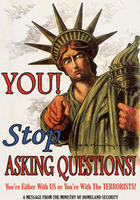Anti-war protesters back in court for spilling blood


By WILLIAM KATES
Associated Press Writer
September 17, 2005, 1:24 PM EDT
BINGHAMTON, N.Y. -- Four anti-war protesters who spilled their own blood at a military recruiting station accused the Bush administration of trying to intimidate them and others from demonstrating against the Iraq war by prosecuting them in federal court.
The four defendants _ dubbed "the St. Patrick's Four" for their March 17, 2003 protest _ go on trial in U.S. District Court beginning Monday. The U.S. Attorney's Office decided to prosecute the four following a mistrial in April 2004 in Tompkins County Court, where the 12-person jury ended in a deadlock after nine members voted to acquit the protesters.
.S. Attorney Glenn Suddaby and Tompkins County District Attorney George Dentes declined to discuss the case and the reasons the federal government was proceeding with the prosecution.
"This is part of the right wing agenda," said Daniel Burns, a 45-year-old father of two from Ithaca, one of the four defendants. "Anyone who disagrees with this administration and dares to show it gets the crap beat out of them."
To back his accusation, Burns ran off the names of former administration officials who ran afoul of Bush: Paul O'Neill, his first treasury secretary, who was fired after expressing misgivings about the need for additional tax cuts; economic adviser Lawrence Lindsey who was ousted after estimating that the cost of the Iraq war would be higher than what Bush was publicly saying; and Valerie Plame, the CIA agent whose identity was leaked following public criticism leveled against the Bush White House by Plame's husband, former U.S. Ambassador Joseph Wilson.
"They punish anyone who criticizes them. It is nothing short of fascism," said Burns, an independent documentary filmmaker who said he paints houses and walks dogs to make ends meet. Burns' father was former Binghamton Mayor John Burns, who also headed the New York State Democratic Committee.
"The federal government is clearly trying to make an example of these people and intimidate future nonviolent protesters by charging these folks with conspiracy," said Bill Quigley, a law professor at Loyola University acting as legal adviser to the four defendants, who are representing themselves.
Two days before the invasion of Iraq, Burns and co-defendants Peter DeMott, 58; and sisters, Teresa Grady, 39; and Clare Grady, 46; were arrested at a U.S. Army and Marine Corps recruiting station at a mall in Lansing, about 65 miles south of Syracuse. During the protest, they splattered their blood onto the windows and walls, posters, pictures and an American flag.
The four are members of Catholic Worker, a social justice organization with 130 communities in the United States. They contend the U.S. war in Iraq is illegal and said they were upholding international law in a justifiable nonviolent protest.
Burns and DeMott were previously convicted of trespassing at the recruiting station in December 2002 and each spent a week in jail.
The four were tried on charges of trespassing and criminal mischief, misdemeanors punishable by up to one year in jail.
After the mistrial, Dentes said rather than run the risk of another hung jury, he would turn the case over to federal prosecutors.
If convicted in federal court, each could face up to six years in prison and fines as high as $250,000 on the primary charge of conspiracy to impede an officer of the United States. They also are charged with damaging governmental property and entering a military station for unlawful purposes.
The prosecution is unusual but not unprecedented, said Barrie Gewanter, head of the Central New York chapter of the American Civil Liberties Union. Gewanter said the federal government has been fairly consistent about pursuing prosecutions where the protests involved damage to government property.
While the ACLU does not support acts of civil disobedience _ even nonviolent ones _ it is concerned about how the government is handling this case, she said.
"It seems the government has decided they weren't punished enough," Gewanter said. "This appears to be about more than just keeping order and enforcing the law ... this suggests the government is more motivated by the message than by the conduct of the defendants and is retaliating for that message and opposition to government policy."
Link Here




0 Comments:
Post a Comment
<< Home